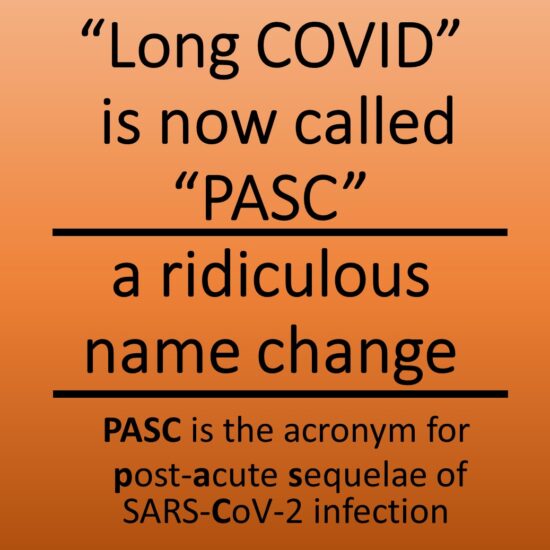“Long COVID” is now called PASC. PASC is the acronym for post-acute sequelae of SARS-CoV-2 infection (PASC). This is a ridiculous name change.
Long COVID is sometimes referred to as “Long Haul COVID”. Either way, whether it is “Long COVID” or “Long Haul COVID”, the term is easy for people to learn, pronounce, and understand. Long COVID is also relatively self-explanatory. Long COVID is simply long-term effects after a COVID-19 infection. That’s easy. Clear. Simple.
But sometimes when experts and bureaucrats find something that is working well they can not resist messing with it and making it worse. Much worse.
So, Long COVID is now called PASC.
Post-acute sequelae of SARS-CoV-2 infection (PASC).
PASC is a ridiculous term.
Experts unfortunately decided to change the name from Long COVID to something that will be tough for most people to remember or understand. Learning and using the new name will be especially tough for the following people: those who do not work in medicine or science, those who do not have the privilege of advanced education (and the vocabulary that comes along with that), those with reading or learning or memory disabilities, and those who use English as a second language. As discussions increase about health equity, we should have our words provide easier access to medical understanding. Instead, the term PASC will be a hurdle that prevents many people from learning about this condition. Worse yet, if people do not know or understand what something is called then they will have a difficult time finding medical care for that condition. Creating and using unnecessarily complex jargon is one way that elite groups unintentionally make things difficult for others.
As physicians and medical educators, we are told that medical communication should strive to meet the public at the grade school reading level. This is not ‘dumbing things down.” Rather, it is speaking or writing in a way that is clear to as many people as possible.
But… in the phrase “post-acute sequelae of SARS-CoV-2 infection” every single word will be unfamiliar to MANY or MOST non-medical people…
- “Post:” many people don’t know that this means “after.” Also, there are many non-medical uses of ‘post’ such as blog posts, post offices, fence posts, an office or position to which a person is appointed, Post-it notes, etc.)
- “Acute:” many/most people don’t know that this means “sudden in onset.” Also, acute can mean “severe,” which is thus potentially inaccurate since Long-COVID can potentially happen to those whose initial COVID was relatively mild, rather than severe. Also, there are non-medical uses of such as acute angles in mathematics. Also, acute can mean wise or insightful, such as an acute observation. Lastly, when spoken “acute” sounds like you are saying that something is “cute.”
- “Sequelae:” many people don’t know that this means “effects that come later, after some prior cause.” Even fewer people can spell it. The word sequelae is so uncommon that my internet browser keeps telling me that I am probably just misspelling the word sequel. Also, this term is redundant since sequelae are always post (sequelae can only come *after* something, never before). So, “post ___ sequelae” are effects that happen “after ___ after.”
- “SARS-CoV-2:” is a medical/scientific name. But despite all of us being more than a year into the pandemic the vast majority of doctors/scientists still don’t say SARS-CoV-2 in common discussions (they say COVID-19 instead), and almost zero non-science folks use the term SARS-CoV-2.
- A bad acronym: Even as an acronym, PASC doesn’t quite work. For the letter “C” they picked a letter part way through the term SARS-CoV-,2 rather than the first letter (“S“). And the letter “I” at the start of the word infection fails to be included in the acronym at all. So really it would need to be PASCI. Also, when spoken in English “PASC” is tough for listeners to understand. It sounds like passed, or past. (PASCI would be just as bad, and it would sound like “pass key.”)
Think of other examples. People became familiar with the term “Lyme disease” because this term is easy to say, spell, and remember. Having an easy phrase then allows people to learn the details of the condition. When Lyme symptoms are more long term, it is therefore simple to call it Chronic Lyme disease. But imagine if we changed the name from “Chronic Lyme disease” to “PASBD” as the acronym for post-acute sequelae Borrelia burgdorferi infection. PASBD would be a foolish and confusing change. Similarly, PASC is a foolish change.

Normally I focus on tailbone pain, but as a medical educator I am pointing out the problems with unnecessary medical jargon. The term “Long COVID” should stay. I will pass on PASC.
References:
Medscape Medical News, “Fauci Introduces New Acronym for Long COVID at White House Briefing”. February 24, 2021. Online at: https://www.medscape.com/viewarticle/946419
Medscape “Trending Clinical Topic: PASC”. online at: https://reference.medscape.com/viewarticle/947023
- Coccygectomy: Expected Recovery and Return to Work after surgery for coccyx pain, tailbone pain. - November 28, 2023
- PRP Platelet Rich Plasma or Prolotherapy for Tailbone Pain, Coccyx Pain - October 25, 2023
- Reasons for Normal X-rays and MRI Despite Tailbone Pain, Coccyx Pain - October 3, 2023

